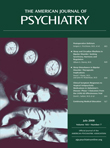Delirium Associated With Lamotrigine and Fluoxetine Treatment
To the Editor: The anticonvulsant lamotrigine has been increasingly utilized as a mood stabilizer after receiving approval by the Food and Drug Administration for the treatment of bipolar I disorder. Although there have been relatively few reports of toxicity, we report a case of delirium with lamotrigine use, which highlights the importance of cautious dose increase and attention to potential drug interactions.
“Ms. A” was a 35-year-old married, employed, Caucasian woman who had been treated for depression with fluoxetine (40 mg) over the past 5 years. She had no history of confusion, psychosis, or suicidality. Two months prior to admission to our intensive care unit, her psychiatrist added lamotrigine to her medication regimen to treat a mood instability characterized as a bipolar spectrum disorder, although she did not have bipolar I disorder. Her lamotrigine had been increased from 200 mg to 400 mg daily within the 2 weeks prior to her admission. During this time, she developed confusion associated with visual and auditory hallucinations. She also developed the belief that her medications were prenatal vitamins, although she was not pregnant. Consequently, she ingested 200 mg of fluoxetine and 2800 mg of lamotrigine. At admission, her urine toxicology and blood alcohol tests were negative, and there was no other medical evidence to explain her delirium. Her family members corroborated her history that the confusion was completely out of character, and there was no evidence of suicidality to suggest an intentional overdose. Ms. A’s delirium resolved on the second hospital day after she discontinued both medications. She displayed a euthymic mood with a good sense of humor, and there was no further evidence of confusion or hallucinations.
Previous reports have suggested that episodes similar to the one experienced by our patient may occur with lamotrigine use. In an analysis of 1,400 cases, Brandt et al. described six patients who experienced adverse events involving psychosis (1) . Selek and Savas speculated on the study conducted by Brandt et al., suggesting that the patients may have actually had delirium (2) . The occurrence of delirium with concurrent administration of lamotrigine and valproate has also been described (3) . Regarding drug interactions that are most relevant to our case, Kaufman and Gerner reported two cases of lamotrigine toxicity as a result of interaction with sertraline use, which demonstrates a significant increase in lamotrigine levels (4) . In our patient, the Naranjo Adverse Drug Reaction Probability Scale score was 7, which suggests that the symptoms she experienced were a probable drug reaction (5) . We believe that either toxicity as a result of an interaction of lamotrigine with fluoxetine or the increased dose of lamotrigine was the most likely explanation for delirium in our patient, which argues for caution in prescribing lamotrigine for off-label psychiatric indications.
1. Brandt C, Fueratsch N, Boehme V, Kramme C, Pieridou M, Villagran A, Woermann F, Pohlmann-Eden B: Development of psychosis in patients with epilepsy treated with lamotrigine. Epilepsy Behav 2007; 11:133–139Google Scholar
2. Selek S, Savas HA: Psychosis, delirium, or manic switch due to lamotrigine? Epilepsy Behav 2007; 11:476Google Scholar
3. Mueller TH, Beeber AR: Delirium from valproic acid with lamotrigine. Am J Psychiatry 2004; 161:1128–1129Google Scholar
4. Kaufman KR, Gerner R: Lamotrigine toxicity secondary to sertraline. Seizure 1998; 2:163–165Google Scholar
5. Lanctot KL, Naranjo CA: Comparison of the Bayesian approach for assessment of adverse drug events. Clin Pharmacol Ther 1995; 58:692–698Google Scholar



